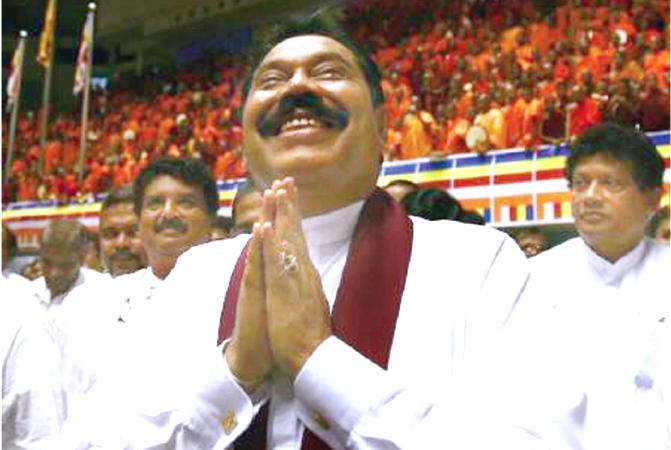
 It is our fate to live in this lost age of promise and hope. As the brilliantly blunt political satirist Art Buchwald put it, These are not the best of times or the worst of times but the only times we’ve got.
It is our fate to live in this lost age of promise and hope. As the brilliantly blunt political satirist Art Buchwald put it, These are not the best of times or the worst of times but the only times we’ve got.
New Year festivals are measures of time. From our tribal days, we have relied on festivals and rituals usually linked to harvesting times as a device that offers a renewal of life. On this New Year, our nation is focused not so much in a renewal in life but to make sense out of chaos that surrounds us in life.
After a life and death struggle to free ourselves from a tyrannical autocracy which succeeded somewhat partially, we seem to be again blinking at the abyss, tottering at the top of the precipice of parochial prejudice.
A group of Marxist philosophers now known as the ‘Frankfurt School’ fled Hitler’s Germany and took refuge in Berkeley California.
In that Academic refuge, the leader of the group, Theodore Adorno edited a volume titled The Authoritarian Personality. It was a part of a larger project that covered what bothers us today. It was called “Studies in Prejudice”.
The thinkers led by Adorno dissected the ‘Authoritarian Personality.’ They used what was called the F scale- the Fascist scale. It identifies nine principal traits in the authoritarian personality.
Exaggerated concern
Power and Toughness is carefully projected. Conventionalism is observed with meticulous attention. Submission to authority was amply rewarded. Anti-intellectualism was religiously observed. S
uperstition was ingrained. Destructive nature was habitual. Cynicism towards general norms was natural. The authoritative personality had an exaggerated concern over sex.
Now, if the reader can identify the Authoritarian personality in our midst today using the F scale designed by the Frankfurt School – the path breaking philosophical think tank of the 20th Century, my labours would be amply rewarded. Our society is a primitive society. Our cultural attitudes resist economic incentives and opportunities. We want school uniforms. We do not want vouchers. We need the fertilizer in a bag. We do not want to decide what fertilizer to use. We have stopped thinking for ourselves.
The authoritative personality, the powerful patriarch, beloved of the Sangha does all the thinking we need.
The Sangha endorse what the leader wants because they are in comfortable collusion to keep things as they are.
Now comes our greatest misfortune. By a combination of fortuitous circumstances, we succeed in changing the helmsman. Hope is short lived.
The changed order is not authoritative but is subject to the authority of the traditional order. In this age of space travel, we believe, the surface of the moon has the profile of the rabbit painted by ‘Sakka’ the king of gods who is also entrusted with the task of protecting this sacred island.
This warped piety and allegiance is the bane of pluralist and democratic Sri Lanka. With Sangha in authority, over matters political, our entrapment is deadly. The vertical transmission of cultural and social values is a weapon that was developed with exquisite élan in the decade of the Mahinda Rajapaksa monolith.
Electronic, digital media
Rajapaksa brothers are sponsors and patrons of nearly all Buddhist ventures in to electronic and digital media. This vertical transmission is as effective as genetic inheritance.
Karl Marx told us that economic development would bring about pervasive cultural changes. A century and a half later, Samuel Huntington in his Clash of Civilisations insists with more than adequate proof that cultural values are an enduring and autonomous influence on society.
Bhikku Madagoda Abayatissa thera is the spiritual pilot and rhetorical navigator of the Pohottu Party and the Rajapaksa Klan. Speaking at the launch of a book – Punchi Chandayen Janapathiwaranayata Kalayuththe Kumakda’ (Lessons of the mini election for Presidential stakes) he presented the flight plan for the Pohottuwa party. “We must build a nationalist movement as was done in 1956.”
Negative side
We have come a long way since 1956. What happened in that watershed year was a historical change of course. What the monk remembers is the negative side of that change.
There was also a positive side of that change that Pieter Keuneman the Communist later recalled. “I doubt whether we will ever witness so moving a spectacle as the people streaming in to Parliament, as they did after the election of 1956 and reverently and affectionately stroking the benches where the members they elected would sit.”
Despite the disorder that followed the negative aspects of the 1956 that Rasputin of the Rajapaksa tribe recalls today, the country has progressed. Received wisdom assumes that economic development impacts traditional norms and values. We mistakenly hope that absolute assumptions, beliefs and practices of the tribal order will make way for a plural order that is rational, tolerant, trusting and participatory.
Cultural change is path dependent. Who sets out the path? In our Sri Lanka the Buddhist clergy still exercise that prerogative.
Mahinda Rajapaksa during his Presidency gave Ven Medagoda Abayatissa thero a first-hand experience of the perks that await mercenary monks.
He is anxious to have them restored. It included a state security detail, a Pajero SUV among others. Raja Bhavathu Damminko.
